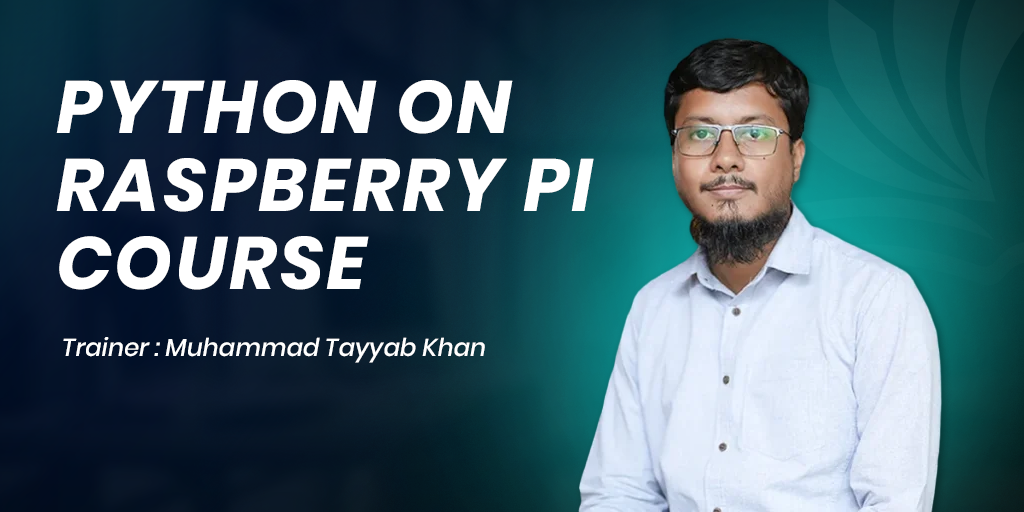- GOOD NEWS: On-going student will recieve 10% OFF!
Learn Python programming on Raspberry Pi for practical hardware projects.

Get started with Raspberry Pi in this introductory course! Learn the basics of Python programming and how to connect and use different sensors with your Raspberry Pi.
You’ll explore the key features of Raspberry Pi and how to apply them in real-world projects. This hands-on course will help you develop the skills needed to create exciting Raspberry Pi projects.
This course is designed for developers, tech enthusiasts, and anyone looking to master the skills needed to create innovative projects with the Raspberry Pi platform. Whether you’re just starting or have some experience in electronics and programming, this course will provide you with the essential knowledge and hands-on experience to excel in Raspberry Pi development.
You will learn how to set up the Raspberry Pi environment, program using Python, and connect sensors and components like LEDs, motors, and sensors (DHT11/DHT22, PIR, LDR). By working on real-world projects such as smart home systems and environmental monitors, you’ll gain practical experience. By the end of the course, you’ll be well-equipped to build and deploy Raspberry Pi-based projects, ready to bring your creative ideas to life.

Your Expert Trainer
Senior Software Engineer
3 Months
72 Total
6 Weekly Hours
Muhammad Tayyab Khan, a BS Electrical Engineering graduate from Sir Syed University, possesses 8 years of professional experience in electronics, including 2 years as an Embedded Firmware Developer. Specializing in Raspberry Pi, he expertly teaches programming, sensor integration, and practical project development. His structured, approachable, and engaging teaching style ensures learners grasp concepts effectively while enjoying the process.
Through hands-on training, Tayyab empowers students to confidently work with Raspberry Pi, applying their skills to real-world applications, innovative solutions, and creative problem-solving in the field of electronics and IoT.
The Python and Raspberry Pi Week-by-Week Learning Pathway offers a structured approach to mastering Raspberry Pi setup, Python programming, sensor integration, GPIO control, and practical projects for building real-world, interactive electronics applications effectively.
This month focuses on understanding the core principles and foundational concepts of the Raspberry Pi microcontroller and Python programming. By the end of this phase, you will have a solid grasp of the basics required to start building exciting projects with Raspberry Pi
Set up Raspberry Pi and get an overview of Raspberry Pi OS. Learn the basics of Python programming, including syntax, variables, data types, and operators.
Explore Python control structures like if statements, loops, functions, and modules to structure your code effectively on Raspberry Pi.
Understand Raspberry Pi GPIO pins and use the GPIO library in Python. Complete a project to control a blinking LED, demonstrating GPIO pin functionality.
Learn about Python data structures such as lists, tuples, and dictionaries and how to apply them in Raspberry Pi projects.
This month focuses on enhancing your skills in working with various components and understanding advanced concepts with Raspberry Pi. By the end of this phase, you’ll be equipped to develop more complex projects using sensors like DHT11/DHT22, PIR, and LDR. You will also learn to read data from these sensors, trigger actions based on sensor data and understand voltage dividers.
Introduce sensors like DHT11, DHT22, PIR, and LDR. Learn how to interface these sensors with Raspberry Pi for your projects.
Build a temperature and humidity monitoring project using DHT11/DHT22 sensors, read data in Python, and display it on the console.
Create a motion detection system using a PIR sensor, read data from it, and trigger actions based on motion.
Develop a light intensity measurement system with an LDR sensor, read the data, and understand the concept of voltage dividers for accurate readings.
This month focuses on enhancing your home automation skills using the Home Assistant platform. You’ll connect and configure DHT11/DHT22, PIR, and LDR sensors, create and customize a dashboard, integrate sensors, and automate tasks based on sensor data. By the end, you’ll be able to develop a complete smart home system with integrated sensors and automation.
Set up Home Assistant on Raspberry Pi and understand how to use it for controlling and automating devices.
Integrate DHT11, DHT22, PIR, and LDR sensors with Home Assistant and configure them for automation.
Create and customize a smart home dashboard in Home Assistant to display real-time sensor data and control devices.
Build a comprehensive smart home system by integrating sensors, automating tasks, and troubleshooting for a seamless final project.
We offer hands-on training and real-world project experience to help students and professionals excel in their careers.